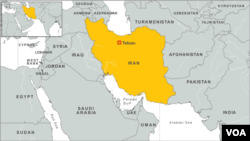Pakistan has been planning to build a pipeline to import natural gas from Iran for years, but work on the proposed Iran-Pakistan pipeline stalled due to international economic sanctions on Iran in response to its nuclear development program.
Pakistan has a crippling energy shortage. Rolling blackouts of several hours a day are the norm in urban and rural areas. As the weather heats up and demand for electricity increases, the situation gets worse. Industrial and agricultural production suffer.
The solution to some of these problems lies in importing more natural gas, according to Shahid Khaqan Abbasi, Pakistan’s minister for petroleum and natural resources.
“Gas is 50 percent of Pakistan’s total energy needs today,” he said.
Now, with the prospect of sanctions on Iran lifting in the near future, Pakistan is hoping to become one of the early beneficiaries of a nuclear deal between Iran and six world powers by finally completing the Iran-Pakistan pipeline.
But funding for the expensive project, expected to cost about $2 billion, is another problem for cash-strapped Pakistan. That is why it is trying to piggyback this project on another one funded mostly by its rich neighbor, China.
China will provide 85 percent of the $2 billion required to build a liquid natural gas terminal at Pakistan’s southern port city Gwadar. The project includes a 700 kilometer long pipeline to other areas of the country.
The LNG project is expected to start in October and take 30 months to build. Petroleum Minister Abbasi said the same pipeline will turn into the Iran Pakistan gas pipeline when the time comes.
“So as soon as we see that the sanctions are lifted or being lifted, there is only [an] 80 kilometer stretch of pipeline that we have to build. And that can be built in about six months,” Abbasi explained.
The same Pakistani port will be at the heart of the China Pakistan Economic Corridor, which plans to connect Gwader to western China's autonomous Xinjiang region with a network of highways, railways and pipelines. The connection to the sea would drastically reduce shipping times and costs from China to the Middle East and Europe.
Once sanctions on Iranian imports are lifted, Pakistani officials said, trade with their neighbor will significantly improve, with crude oil, petrol and diesel expected to be some of the hot commodities.
In addition, they added, much of the Iranian oil that was “floating around in the market informally” in the black market, will now be formalized.












